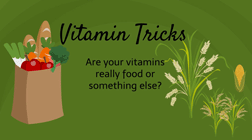Synthetic folic acid again blamed for increased colon cancer risk
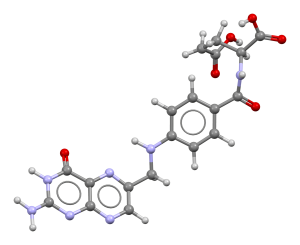
Model of synthetic folic acid (Wikipedia)
Ran across the following:
June 2, 2025
Ever since the 1990s, colon cancer rates among young people under the age of 50 have skyrocketed, and the establishment is pretending not to know why.
Poor diet, they admit, is probably linked as genetically modified organisms (GMOs) were first introduced right around the time colon cancer started becoming a serious problem in young people. Other dietary factors linked to colon cancer include processed, highly inflammatory foods and alcohol.
The American Cancer Society (ACS) published a report recently about the phenomenon, which is further explained by another study published in the journal Cancer Research Communications that once again points to dietary factors, and particularly the consumption of synthetic folic acid.
While most countries do not add synthetic folic acid to bread and flour-based products, the United States and Canada do. This explains, in part, why young people everywhere are succumbing to colon cancer at rates never before seen in human history.
In 1996, the U.S. Food and Drug Administration (FDA) issued a decree ordering all enriched grain products to be “fortified” with folic acid by the year 1998, the claim being that this synthetic, folate-like substance prevents birth defects. Almost immediately afterwards, colon cancer rates started to soar in America’s younger population.
“Folate and folic acid are often used interchangeably, but there is a notable difference between the two,” explains Jennifer Sweenie, writing for The Epoch Times. “Folate is a B vitamin found naturally in certain foods, including fruits, vegetables and legumes. During the digestive process, your body converts folate into its active form before entering the blood.”
“Folic acid is simply a synthetic form of folate used in enriched food products. Your body isn’t able to metabolize folic acid as easily as naturally occurring folate. The process of converting folic acid to its active form takes longer than it does with folate. This can lead to a buildup of folic acid in the blood, and eating fortified food products may contribute to that surplus.” https://100percentfedup.com/colonncer-rise-young-adults-gmos-vaccines-synthetic-4/
This is not a surprise. I have long warned about the dangers of folic acid–including colon, breast, and prostate cancer risk. There is no such thing as natural folic acid–if you see the words “folic acid” on a label of supplements or some food, that means it contains that synthetic. For more on folic acid, here is a link to a paper I wrote: Folic Acid is Hazardous to Your Health. What About Food Folate? (The Original Internist, 17(2) June 2010, 88-90).
It is not just folic acid that is not as good as vitamins in their natural form. See also another paper I wrote: Natural Vitamins May Be Superior to Synthetic Ones. (Medical Hypotheses, 2000; 55(6):461-469)
Notice another report about the dangers of the typical vitamin supplements that many people take:
Dietary supplements linked to increased cancer risk
Dr. Tim Byers, director for cancer prevention and control at the University of Colorado Cancer Center, conducted a meta-analysis of two decades worth of research — 12 trials that involved more than 300,000 people — and found a number of supplements actually made a person much more likely to develop certain types of cancer.
Byers began his investigation on the association between supplements and cancer risk 20 years ago. He and many other researchers observed that people who ate more fruits and vegetables cut their risk for cancer. Byers and his colleagues wondered if taking supplements that provide the same vitamins and minerals as fruits and vegetables could offer similar protection.
But his findings suggested just the opposite — rather than warding off cancer, taking lots of supplements may raise a person’s risk. …
Byers presented his research Monday at the annual meeting of the American Association for Cancer Research, in Philadelphia.
Through his analysis, Byers found that people who took high doses beta carotene supplements had an increased risk for lung cancer. Selenium supplements were associated with skin cancer. Men who took vitamin E had an elevated risk for prostate cancer. Folic acid, a B vitamin, taken in excess could lead to an increased risk for colon cancer.
Byers says it’s still unclear why supplements could have this adverse effect, but he and other researchers hope to learn more about the association. (Firger J. CBS News. April 20, 2015 http://www.cbsnews.com/news/dietary-supplements-linked-to-increased-cancer-risk/)
So why do typical vitamin supplements not provide the same protection as nutrients found in foods?
For decades the ‘natural’ health industry has been touting thousands of vitamin supplements. The truth is that most vitamins in supplements are made of or processed with petroleum derivatives or hydrogenated sugars hence they are synthetic. Even though they are often called natural, most non-food vitamins are isolated substances which are crystalline in structure. Vitamins naturally in food are not crystalline and never isolated. Non-food vitamins are isolates, which means that they are individual chemicals lacking substances that real foods contain. Vitamins found in any real food are chemically and structurally different from those commonly found in ‘natural vitamin’ formulas. Food vitamins contain a matrix of substances which improve bioavailability and safety. Since they are different, naturally-oriented people should consider non-food vitamins as vitamin analogues (imitations) and not actually vitamins. Whether sold retail or wholesale, nearly all companies sell synthetic vitamins.
A ‘dirty little secret’ of the so-called natural health industry is that nearly all vitamins sold are synthetic isolates often made of petroleum derivatives.
Furthermore, the Bible warns about eating things that are not really food:
2 Why do you spend money for what is not bread,
And your wages for what does not satisfy?
Listen carefully to Me, and eat what is good (Isaiah 55:2).
Refined processed “breads,” refined and artificial sweeteners, chemical additives, and some other items commonly associated with junk foods and hydrogenated fats would seem to be consistent with that warning.
Breakfast cereals used to be one of the original ‘health foods’ when Dr. Kellogg first introduced Corn Flakes at his clinic in Battle Creek, Michigan. It was basically made of whole organic corn. Now, it seems to be made with GMO corn (its label does not state otherwise, which in the USA means the corn source is almost always genetically-modified) and is ‘fortified’ with synthetic vitamins.
Many other breakfast cereals, especially the ones targeted towards children are made of refined, degerminated grains, synthetic vitamins, a lot of sugar, and artificial colors. Pop-Tarts made of refined, degerminated grains, synthetic vitamins, fruit, sugar, gelatin (probably biblical unclean; see also The New Testament Church and Unclean Meats), and artificial colors.
Many Americans (and others) consume synthetic vitamins that they tend to consider to be “health food.” Synthetic vitamins are often in forms that are foreign to the human body (i.e. there is no such thing as isolated thiamin hydrochloride (thiamin HCL) in a natural food, but that is one form that refined foods are ‘fortified’ with–foods mainly contain vitamin B-1 as thiamin pyrophosphate. Most USP vitamins are petroleum derivatives and/or processed with formaldehyde and/or acetone.
Synthetic/USP (United States Pharmacopoeia) vitamins are not only isolates, they tend to be crystalline in structure. Vitamins complexed in foods appear rounder. Notice some electron microscope photos of food and synthetic vitamins:
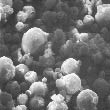

Food Thiamin vs. USP Thiamin HCL
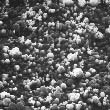
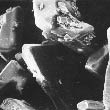
Food Vitamin C vs. USP Ascorbic Acid
Perhaps I should comment that most minerals Americans (and others) purchase are basically ground up industrial rocks with acids added to them. While plants can properly convert rocks into food, humans are supposed to eat food. Unless people consider bones or shells to be foods (which do contain hard mineral salts), foods simply do not contain the type of two word mineral salts that are used in most vitamin-mineral formulas.
Here are electron microscope photos of food and rock zinc:

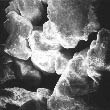
Food Zinc vs. USP Zinc Chloride
Most people consuming minerals are consuming ground up rocks. The chemical forms of these mineral salts can be ‘natural,’ but they are not natural for humans to eat. Actually, eating ground up rocks/dirt is considered as a medical condition called ‘pica.’ Yet, many ‘health food’ supplements contain these substances for minerals that are totally foreign to human foods.
An Iowa study involving over 30,000 older women found that those that regularly consumed a synthetic vitamin pill died years before women that did not. In 2017, a study found that smokers who took high doses of synthetic vitamins B6 and B12 had a significantly increased risk of developing lung cancer than smokers who did not.
Synthetics are not good!
What should you eat? You should eat real food and be careful about your quantities.
2…Listen carefully to Me, and eat what is good (Isaiah 55:2).
People should try to eat real, not artificial, foods. And if you take vitamins and minerals, take the type whose nutrients are 100% food (which is what I personally do).
Although many mainstream health professionals believe, “The body cannot tell whether a vitamin in the bloodstream came from an organically grown cantaloupe or from a chemist’s laboratory,” this belief is quite misleading for several reasons. First it seems to assume that the process of getting the amount of the vitamin into the bloodstream is the same (which is frequently not the case). Secondly, scientists understand that particle size is an important factor in nutrient absorption even though particle size is not detected by chemical assessment. Thirdly, scientists also understand that, “The food factors that influence the absorption of nutrients relate not only to the nature of the nutrients themselves, but also their interaction with each other and with the nonabsorbable components of food.” Fourthly, “the physiochemical form of a nutrient is a major factor in bioavailability” (and food and non-food vitamins are not normally in the same form). Fifthly, most non-food vitamins are crystalline in structure.
Natural food vitamins are nutritionally superior to synthetic ones. Synthetic isolates are crystalline in structure and are often in chemical forms that are foreign to the human body.
I have known for years that synthetic vitamins are dangerous and have had papers published about this (e.g. Thiel R. Natural vitamins may be superior to synthetic ones. Med Hypo 2000 55(6):461-469).
As far as what most people take as vitamins goes, it does NOT matter if the label says ‘natural’ as there is no government standard of what that means in most supplements.
Notice the following (bolding in source below):
Some ‘natural’ products are anything but
Vitamin pills can be synthetically, and legally, produced in a lab. Synthetic ingredients are even allowed in multi-vitamins that bear the Department of Agriculture’s “Organic” seal…
“Vitamins can be synthetic because, by definition, a vitamin does not have to come from nature,” says Fabricant at the FDA. (Vitamins & supplements. Consumer Reports, September 2012: 18-23)
Most people who take vitamin supplements falsely believe that what they are taking is ‘natural,’ but that is not the case. Isolated vitamins simply do NOT NATURALLY EXIST in nature. Foods are a complex matrix of many substances and vitamins are never isolated in foods. I would also add that most so-called ‘antioxidant’ vitamins that people take DO NOT HAVE PROVEN SIGNIFICANT ANTIOXIDANT EFFECTS IN THE HUMAN BODY, but only are ‘antioxidants’ in test tubes (Hendler S, Rorvik D, editors. PDR for Nutritional Supplements. Medical Economics, Montvale (NJ), 2001 ). But people mislead themselves about this all the time.
Furthermore, there is NO SUCH THING AS ‘NATURAL’ FOLIC ACID. Folic acid is unnatural, folic acid is synthetic, and the body cannot properly convert much folic acid into a usable folate form. Furthermore, concerns about folic acid feeding cancer are now a real concern in the 21st Century—too much folic acid may kill you.
“Folic acid is a synthetic folate form” and was not developed until the 20th century. Folic acid is chemically known as pteroylglutamic acid (PGA) and is a crystalline substance (no food vitamins are naturally crystalline in structure). Folate, once also known as vitamin B9, exists in foods, yet crystalline folic acid does not. Folates also differ from folic acid “in the extent of the reduction state of the pteroyl group, the nature of the substituents on the pteridine ring and the number of glutamyl residues attached to the pteroyl group.”
A 2010 report states, “”The more we learn about folic acid, the more it’s clear that giving it to everyone has very real risks,” says folic acid researcher David Smith, PhD, a professor of pharmacology at the University of Oxford in England…The risk experts worry about most: colon cancer. Last year, health officials in Chile reported that hospitalization rates for colon cancer among men and women age 45 and older more than doubled in their country since fortification was introduced in 2000. In 2007, Joel Mason, MD, director of the Vitamins and Carcinogenesis Laboratory at the Tufts University School of Medicine, described a study of the United States and Canada suggesting that rates of colon cancer rose — following years of steady decline — in the late 1990s (around the time our food was being fortified)” (Bell L. Is your breakfast giving you cancer? Research links too much folic acid to certain cancers. Prevention. March. 29, 2010. http://www.msnbc.msn.com/id/35874922/ns/health-diet_and_nutrition//).
The same report also states, “Other research links high doses to lung and prostate cancers. In one study conducted in Norway, which doesn’t fortify foods, supplementation with 800 mcg of folic acid (plus B12 and B6) daily for more than 3 years raised the risk of developing lung cancer by 21 percent. Another, in which men took either folic acid or a placebo, showed those consuming 1,000 mcg of folic acid daily had more than twice the risk of prostate cancer. And a new worry recently came to light when scientists discovered the liver has limited ability to metabolize folic acid into folate — which means any excess continues circulating in the bloodstream. “Unlike folate, folic acid isn’t found in nature, so we don’t know the effect of the excess,” says Smith. Indeed, many scientists have grown increasingly concerned about mounting research — including a study published last winter in the Journal of the American Medical Association — suggesting that all the extra folic acid might increase your odds of developing cancer.”
Even foods “fortified” with folic acid may cause serious neurological problems in patients deficient in vitamin B12 (Carmel R. Folic Acid. In Modern Nutrition in Health and Disease, 10th ed. Lippincott Williams & Wilkins, Baltimore, 2006:470-481). Furthermore, “no folic acid dose can be considered as truly safe in the presence of untreated cobalamin deficiency” (Carmel R. Folic Acid. In Modern Nutrition in Health and Disease, 10th ed. Lippincott Williams & Wilkins, Baltimore, 2006:470-481).
Thousands of years ago, God inspired one of his prophets to pen the following, which encourages people to eat what is good:
2 Why do you spend money for what is not bread, And your wages for what does not satisfy? Listen carefully to Me, and eat what is good, And let your soul delight itself in abundance. (Isaiah 55:2)
Intentionally eating synthetic vitamins is not good. Real science supports this view.
Despite the truth, most people (over 98%) who take typical vitamin supplements believe that whatever they take is actually natural and does not have the risks that researchers keep finding that typical vitamin supplements have. This is a false belief. The truth about vitamins in supplements can be known (see The Truth About Vitamins in Nutritional Supplements), but most do not want to learn and then act on the truth.
My son Brian made two animations related to this:
It was after he did those that I had him make animations for the CCOG Animations Channel.
Consuming large amounts of synthetic vitamins can increase the risk of cancer and other diseases.
Some items of possibly related interest may include:
The Truth About Antioxidants Most ‘antioxidant supplements are not effective for humans.
The Truth About Vitamins in Nutritional Supplements Nearly all vitamins people take are synthetic.
The Truth about Minerals in Nutritional Supplements Nearly all mineral supplements people take consist of industrially processed ground up rocks.
Christian Health Matters Should Christians be concerned about their health? Does the Bible give any food and health guidelines? Here are links to three related sermons: Let’s Talk About Food, Evil is Affecting the Food Supply, and Let’s Talk About Health.
 |
Tweet |
|
